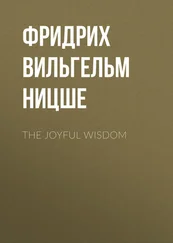475.
BECOMING HEAVY.—You know him not; whatever weights he may attach to himself he will nevertheless be able to raise them all with him. But you, judging from the weak flapping of your own wings, come to the conclusion that he wishes to remain below, merely because he does burden himself with those weights.
476.
AT THE HARVEST THANKSGIVING OF THE INTELLECT.—There is a daily increase and accumulation of experiences, events, opinions upon these experiences and events, and dreams upon these opinions—a boundless and delightful display of wealth! its aspect dazzles the eyes: I can no longer understand how the poor in spirit can be called blessed! Occasionally, however, I envy them when I am tired: for the superintendence of such vast wealth is no easy task, and its weight frequently crushes all happiness.—Alas, if only the mere sight of it were sufficient! If only we could be misers of our knowledge!
477.
FREED FROM SCEPTICISM.—
A. Some men emerge from a general moral scepticism bad–tempered and feeble, corroded, worm–eaten, and even partly consumed—but I on the other hand, more courageous and healthier than ever, and with my instincts conquered once more. Where a strong wind blows, where the waves are rolling angrily, and where more than usual danger is to be faced, there I feel happy. I did not become a worm, although I often had to work and dig like a worm.
B. You have just ceased to be a sceptic; for you deny!
A. And in doing so I have learnt to say yea again.
478.
LET US PASS BY.—Spare him! Leave him in his solitude! Do you wish to crush him down entirely? He became cracked like a glass into which some hot liquid was poured suddenly—and he was such a precious glass!
479.
LOVE AND TRUTHFULNESS.—Through our love we have become dire offenders against truth, and even habitual dissimulators and thieves, who give out more things as true than seem to us to be true. On this account the thinker must from time to time drive away those whom he loves (not necessarily those who love him), so that they may show their sting and wickedness, and cease to tempt him. Consequently the kindness of the thinker will have its waning and waxing moon.
480.
INEVITABLE.—No matter what your experience may be, any one who does not feel well disposed towards you will find in this experience some pretext for disparaging you! You may undergo the greatest possible revolutions of mind and knowledge, and at length, with the melancholy smile of the convalescent, you may be able to step out into freedom and bright stillness, and yet some one will say: “This fellow looks upon his illness as an argument, and takes his impotence to be a proof of the impotence of all others—he is vain enough to fall ill that he may feel the superiority of the sufferer.” And again, if somebody were to break the chains that bound him down, and wounded himself severely in doing so, some one else would point at him mockingly and cry: “How awkward he is! there is a man who had got accustomed to his chains, and yet he is fool enough to burst them asunder!”
481.
TWO GERMANS.—If we compare Kant and Schopenhauer with Plato, Spinoza, Pascal, Rousseau, and Goethe, with reference to their souls and not their intellects, we shall see that the two first–named thinkers are at a disadvantage: their thoughts do not constitute a passionate history of their souls—we are not led to expect in them romance, crises, catastrophies, or death struggles. Their thinking is not at the same time the involuntary biography of a soul, but in the case of Kant merely of a head; and in the case of Schopenhauer again merely the description and reflection of a character (“the invariable”) and the pleasure which this reflection causes, that is to say, the pleasure of meeting with an intellect of the first order.
Kant, when he shimmers through his thoughts, appears to us as an honest and honourable man in the best sense of the words, but likewise as an insignificant one: he is wanting in breadth and power; he had not come through many experiences, and his method of working did not allow him sufficient time to undergo experiences. Of course, in speaking of experiences, I do not refer to the ordinary external events of life, but to those fatalities and convulsions which occur in the course of the most solitary and quiet life which has some leisure and glows with the passion for thinking. Schopenhauer has at all events one advantage over him; for he at least was distinguished by a certain fierce ugliness of disposition, which showed itself in hatred, desire, vanity, and suspicion: he was of a rather more ferocious disposition, and had both time and leisure to indulge this ferocity. But he lacked “development,” which was also wanting in his range of thought: he had no “history.”
482.
SEEKING ONE’S COMPANY.—Are we then looking for too much when we seek the company of men who have grown mild, agreeable to the taste, and nutritive, like chestnuts which have been put into the fire and taken out just at the right moment? Of men who expect little from life, and prefer to accept this little as a present rather than as a merit of their own, as if it were carried to them by birds and bees? Of men who are too proud ever to feel themselves rewarded, and too serious in their passion for knowledge and honesty to have time for or pleasure in fame? Such men we should call philosophers; but they themselves will always find some more modest designation.
483.
SATIATED WITH MANKIND.—
A. Seek for knowledge! Yes! but always as a man! What? must I always be a spectator of the same comedy, and always play a part in the same comedy, without ever being able to observe things with other eyes than those? and yet there may be countless types of beings whose organs are better adapted for knowledge than ours! At the end of all their searching for knowledge what will men at length come to know? Their organs! which perhaps is as much as to say: the impossibility of knowledge! misery and disgust!
B. This is a bad attack you have—reason is attacking you! to–morrow, however, you will again be in the midst of knowledge, and hence of irrationality—that is to say, delighted about all that is human. Let us go to the sea!
484.
GOING OUR OWN WAY.—When we take the decisive step, and make up our minds to follow our own path, a secret is suddenly revealed to us: it is clear that all those who had hitherto been friendly to us and on intimate terms with us judged themselves to be superior to us, and are offended now. The best among them are indulgent, and are content to wait patiently until we once more find the “right path”—they know it, apparently. Others make fun of us, and pretend that we have been seized with a temporary attack of mild insanity, or spitefully point out some seducer. The more malicious say we are vain fools, and do their best to blacken our motives; while the worst of all see in us their greatest enemy, some one who is thirsting for revenge after many years of dependence,—and are afraid of us. What, then, are we to do? My own opinion is that we should begin our sovereignty by promising to all our acquaintances in advance a whole year’s amnesty for sins of every kind.
485.
FAR–OFF PERSPECTIVES.—
A. But why this solitude?
B. I am not angry with anybody. But when I am alone it seems to me that I can see my friends in a clearer and rosier light than when I am with them; and when I loved and felt music best I lived far from it. It would seem that I must have distant perspectives in order that I may think well of things.
486.
GOLD AND HUNGER.—Here and there we meet with a man who changes into gold everything that he touches. But some fine evil day he will discover that he himself must starve through this gift of his. Everything around him is brilliant, superb, and unapproachable in its ideal beauty, and now he eagerly longs for things which it is impossible for him to turn into gold—and how intense is this longing! like that of a starving man for a meal! Query: What will he seize?
Читать дальше











